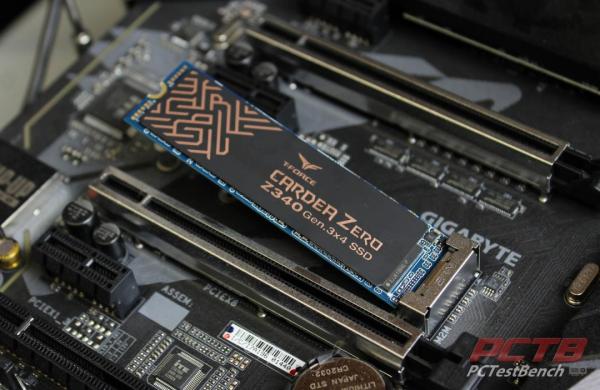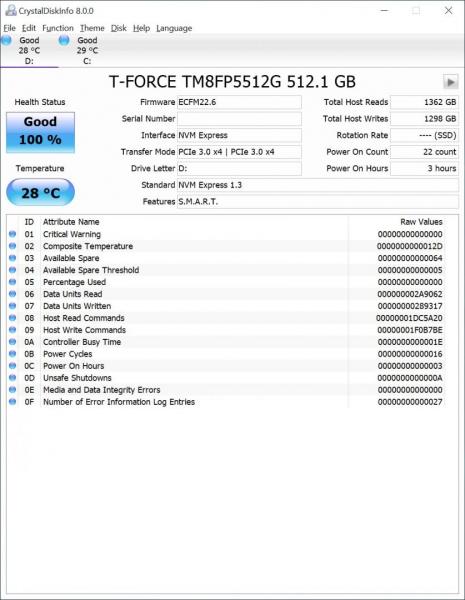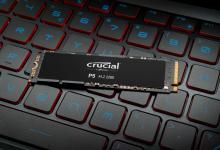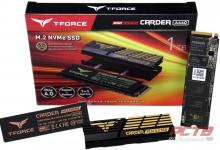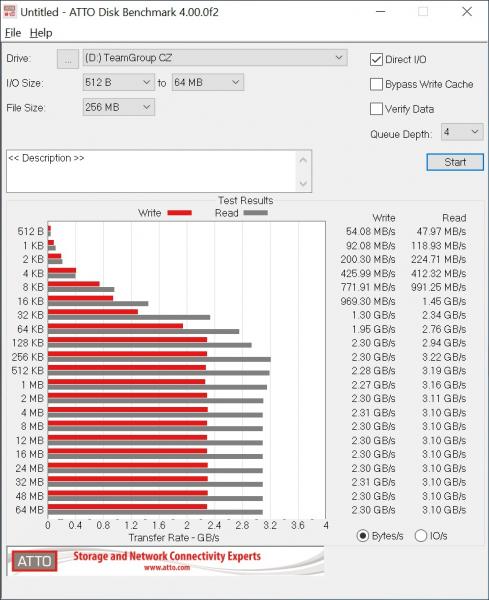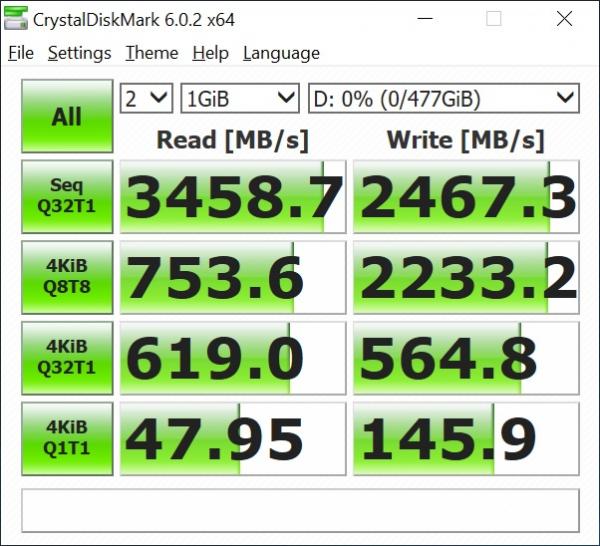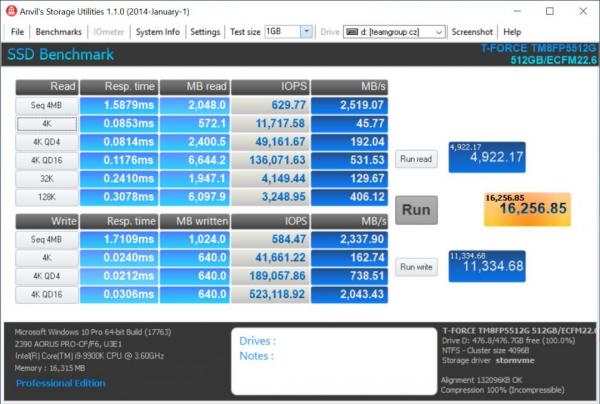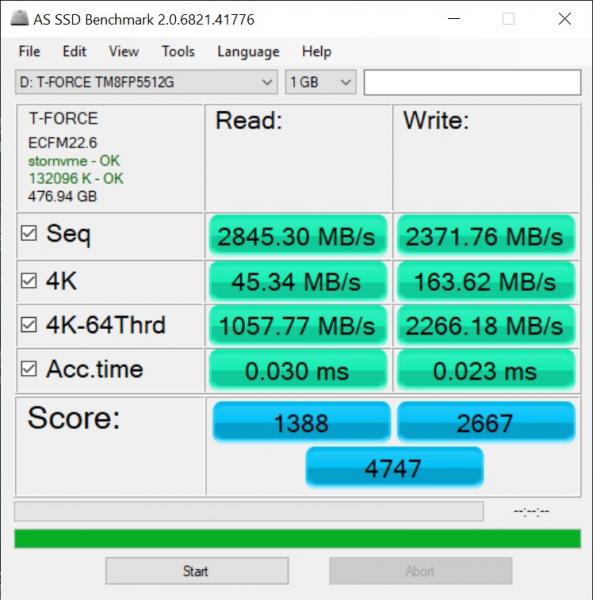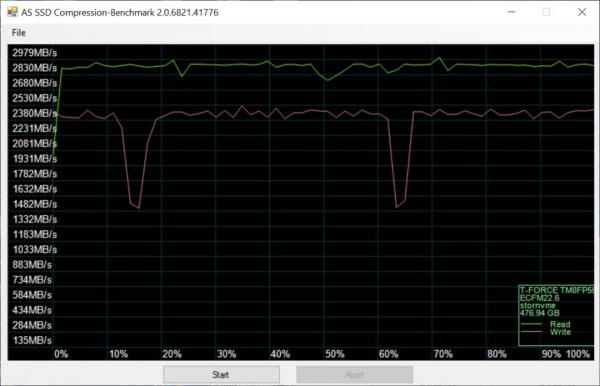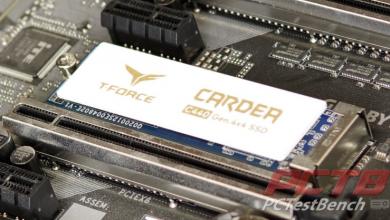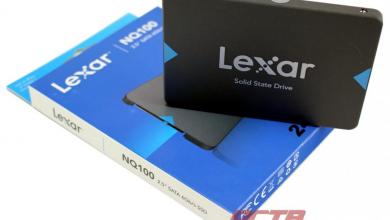TEAMGROUP CARDEA ZERO Z340 512GB M.2 PCIE GEN3X4 SSD REVIEW
System Configuration & Testing
To test CARDEA ZERO we placed it on our open-air teat bench with the following specifications:
- CPU: i9 9900K
- Motherboard: Gigabyte Z390 Aorus Pro
- RAM: 2 x 8GB Corsair Dominator Platinum RGB @ 3200MHz
- GPU: XFX RX5600XT THICC II
- OS Drive: Crucial P1 1000GB
- OS: Window 10 Professional X64
Like I do for all my drive benchmarking sessions, I use CrystalDiskInfo to check out some details of the CARDEA ZERO Z340. We find the CARDEA ZERO setup up as a secondary drive D: and idling at a cool 28C. like mentioned on the packaging the CARDEA ZERO is setup using PCIe 3.0 x4 with the NVMe 1.3 standard.
I will be running the drive through various benchmarking applications to see how it fairs under different workloads. These applications include:
- ATTO Disk Benchmark
- CrystalDiskMark 6.0
- Anvil’s Storage Utilities
- AS SSD
ATTO Disk Benchmark
“As the industry’s leading provider of high-performance storage & network connectivity products, ATTO has created a widely-accepted Disk Benchmark freeware utility to help measure storage system performance. As one of the top tools utilized in the industry, Disk Benchmark identifies performance in hard drives, solid-state drives, RAID arrays as well as connections to storage. Top drive manufacturers, like Hitachi, build and test every drive using the ATTO Disk Benchmark”
Running the CARDEA ZERO through the ATTO benchmark we see a peak write performance of 2310 MB/s and read performance of 3200 MB/s. This echoes what we found on the packaging with read performance just 180 MBs shy of the maximum 3400MB/s and write performance exceeding the rated 2000 MB/s by 310 MB/s.
CrystalDiskMark 6.0
“CrystalDiskMark is designed to quickly test the performance of your hard drives. Currently, the program allows measuring sequential and random read/write speeds.”
In CrystalDiskMark benchmark the CARDEA ZERo Z340 exceeds its rated speed with a blistering 3458 MB/s read and 2467 MB/s write.
Anvil’s Storage Utilities
“Anvil’s Storage Utilities is a powerful tool that was designed to provide you with a simple means of assessing the read and write performance of your Solid State Drive or Hard Disk Drive.
The benchmark tool helps you monitor and check the response time of your unit as well as view the system information collected using Windows Management Instrumentation (WMI).
Anvil’s Storage Utilities has been designed to be the most comprehensive benchmark tool for Solid State Drives on the market. That does not mean that you can’t use it for conventional platter-based drives as well, but you do get the most out of the program when you test the speed and performance of SSDs with it. The program has gone through a series of beta and release candidate builds already and is currently available as Release Candidate 3. It is usually linked from this forum thread, which currently is not the case for the RC build which you can download here directly. You can’t use previous builds as they are set to expire automatically.
You can run a benchmark right away by selecting a drive from the menu at the top right or check out the settings first to make sure everything is configured correctly here. Here you can simulate a compression level of the text file, e.g. database, application, or uncompressed, and whether you’d like to use the same test file on consecutive runs or generate a new one every time. As far as benchmarks go, you can run a standard SSD benchmark that is testing read, write, or both performances of the drive, or run threaded IO benchmarks only.”
In Anvil we see the sequential read speed lower than expected but this quite normal for this benchmark.
AS SSD
“The AS SSD benchmark determines the performance of Solid State Drives (SSD). The tool contains six synthetic and three copy tests.
The synthetic tests determine the sequential and random read and write performance of the SSD. These tests are carried out without using the operating system cache. In Seq-test the program measures how long it takes to read a 1 GB file to write respectively. 4K test the read and write performance is determined at random 4K blocks. The 4K-64 corresponds to the test Third 4K procedure except that the read and write operations are distributed to 64 threads. This test should SSDs pose with Native Command Queuing (NCQ), differences between the IDE operation mode where NCQ is not supported, and the AHCI mode. The additional compression test can measure the power of the SSD in response to the compressibility of the data. This is especially for the controllers that use to increase the performance and life of the cell compression, important.
In the first three synthetic tests and the compression test, the size of the text file 1 GB. Finally, the access time of the SSD is calculated, wherein the access to read over the entire capacity of the SSD (Full Stroke) is determined. The write access test, however, is done with a 1 GB big test file.”
Like Anvil the AS SSD benchmark also reports low read speeds but the CARDEA ZERO has yet again well exceeding its rated 2000 MB/s write speeds.
Looking at AS SSD compression benchmark we see a steady read speed of around 2830MB/s and write speed of 2380 MB/s with 2 drops to 1482 MB/s.
In addition to running the CARDEA ZERO Z340 through these benchmarks, I also paid close attention to its temperature under load. After running the CARDEA ZERO under load for some time we saw a peak temperature of 54C which was much cooler than our Crucial P1 which hit 66C under the same conditions. Since the heatsink on CARDEA ZERO is quite thin I was able to reduce the temperature by another 8C to a cool 46C when I installing my motherboard’s M.2 heatsink.
